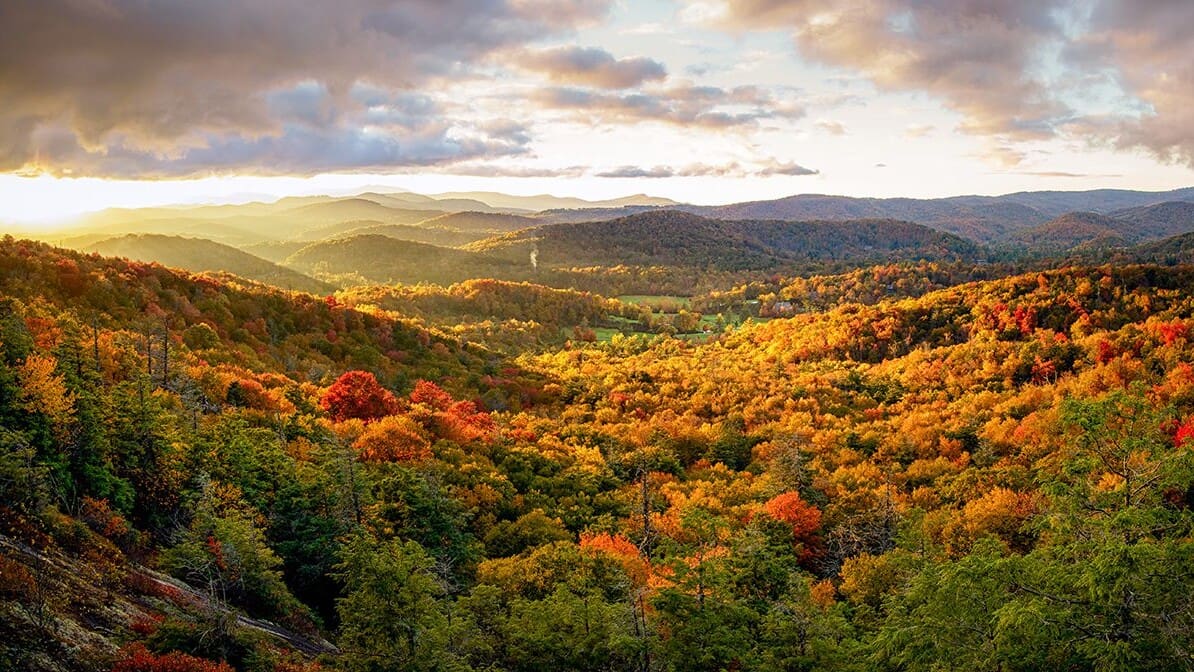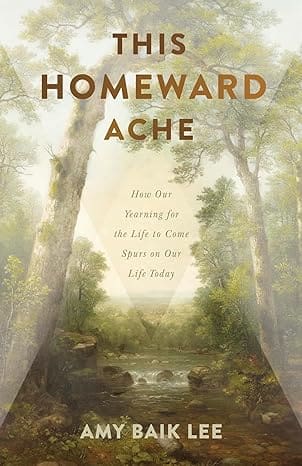- Home
- Spiritual Life
- I Am Homesick

I Am Homesick

Excerpt taken from This Homeward Ache: How Our Yearning for the Life to Come Spurs on Our Life Today by Amy Baik Lee
I am homesick, I think.
It is August 1995, and my view from the ninth floor of an apartment building in Seoul looks nothing like the muted blue and green Appalachian Mountains of my childhood. Concrete villas and low brick buildings sprawl out below me, crowned with bright yellow water tanks and electric red crosses. Mountains blur the left edge of the veranda glass like a stray eyelash in the corner of my sight, but these seem darker and more imposing than the ones I have known.
I look, and I weep, for all the miles between me and the places that have brought me happiness. For that final, strangely poignant moment in North Carolina when we left the playground for the last time, and I knew I could never come to it as a child again—and perhaps, after time and development had gnawed through the land, never see it again at all.
I wrap my arms around my knees. My aunt crouches close and pats my back. “Don’t cry,” she says. “Don’t cry; you’ll make your parents sad.”
I do my best to stanch my tears, but the sadness stems from more than a change of location. Months before arriving in Korea, I witnessed a suicide threat. The image of the incident is branded into my memory and my outlook on the world, and I now carry a suffocating fear with me: a belief that it is my responsibility to keep my friends and family—everyone I love—alive, and happy enough to want to stay alive. I do not confide this fear to anyone, but in it I feel a cold, matter-of-fact severance from my childhood. Nothing is familiar. Lives are terribly, terribly fragile. I wish I could trace my path just a few steps backward, but what separates me from my old home cannot be bridged.
This sense of helplessness, weeks later, prods me to listen carefully to my homeroom teacher’s explanation of Christ. At eleven I relinquish my life to the Lord I’ve sought, one way or another, all my life. I try to settle into the language and the story that has caught me up and seems to be carrying me along. Now I know where I am truly bound; now, surely, all my unsettledness will be laid to rest. The ache will cease.
But it doesn’t.
Something akin to it ambushes me in high school, in a whirlwind of crisping leaves that sweeps around my shoulders and knees on a gray afternoon.
Again, in college, in a stream of color cascading from the stained glass windows of the university chapel.
At first I think it must be homesickness once more, hitting like a fresh blow somewhere over my heart. But there is a sweeter quality to this than the mingling of fear and grief that my aunt saw; it is tinged with the surrender of a laugh that comes after a long cry. Encountering it is like gulping a tonic that makes me thirstier the more I drink, and as irrational as it seems, I want more of this “inconsolable longing,”8 as C. S. Lewis would call it. Why? I wonder. What am I missing?
How can this ache be so strong still?
…
Years later, as I skim an old textbook from college, a literary motif teaches me to delve deeper.
Ubi sunt is a Latin phrase meaning “where are [they]?” and it appears as a line of questioning that became popular in medieval works after the Roman philosopher Boethius used it in The Consolation of Philosophy. “The Wanderer” echoes with it in an elegiac Anglo-Saxon context:
Where has the horse gone? Where is the young warrior?
Where is the giver of treasure? What has become of the feasting seats?
Where are the joys of the hall?
Alas, the bright cup! Alas, the mailed warrior!
Alas, the prince’s glory!
How that time has gone, vanished beneath night’s cover, just as if it had never been!9
The questions are rhetorical. The wandering warrior does not expect an answer from any quarter, but he voices his inquiry anyway.
Silence meets his words; it is as if they ricochet everywhere in search of a presence that should be but no longer is. And in them I begin to perceive a pain that lies at the heart of my longing.
This is loss. In the stark bereavement of the Wanderer’s words, I look back across my own past places and relationships and realize that I have lost “home” more profoundly than I have ever known it.
In my life I have missed nooks and vistas that are half a world away, and earlier times when it seems I bore lighter burdens than the ones I carry now. Yet what I truly miss comes from a deeper sundering; I am missing the wholeness of a world that I have only ever experienced in shards.
The Christian faith speaks of grace and redemption at length, but being part of that true story means we recognize the ravages of what we have lost: the loss of Eden, the loss of unhindered communion with God. We see daily the distortion and absence of real love. And the loss is ongoing; as mortals we know the devastation that comes inevitably with the ebb of time—places erased, bodies deteriorating, loved ones gone.
But the acknowledgment of this loss, I am learning, is a vital part of the longing we bear.
What has become of us? Where have our friends and family gone? Where are the trust and the enthusiasm that used to flow so easily from us? What has happened to this relationship—that old favorite spot—these intervening years? Ubi sunt is one way to begin the first step of grief.
Asked in the pattern set by the Wanderer, ubi sunt questions name what is missing. They give us a sense of the gaps that have opened in our lives and prepare us for the voids in which we will walk as we mourn.
But there is a wondering underneath such questions as well. When we ask, “Where are they?” and “Where is the goodness that used to be?” we are also asking, “Which way is up?” “Where am I supposed to be now, when I feel unable to move?” “How are we to go on?”
I have never been comfortable with pouring out my grief in this way, and at times I have been afraid that releasing certain reservoirs of hidden pain will drown me. Yet the lamenters of the Psalms, Christians throughout the ages, and Christ himself on Calvary were willing to voice their questions without an immediate resolution. They knew that to ask them in the presence of God meant something different from letting them dissipate into the air. Their willingness, their courage to be so vulnerable before the Father, opens a way for us to acknowledge the absences we feel.
Ultimately, to gloss over the losses sustained in the fall of man and its reverberations would be to deny the cost of the rescue, the worth of our ransom, and the surpassing joy Christ saw that made him scorn the shame of the cross (Heb. 12:2 niv). And it would cause us to miss entirely what is coming.
For the pattern given over and over in Scripture, from God’s dealings with Job to Jesus’s promise to give his followers a hundredfold what they have left, is of gain outstripping loss. Only as I plumb the agony of separation can I fathom the magnitude of what lies ahead; only as I heft the weight of this day’s pain do I know how to fix my eyes on Christ and anticipate the deathless, tearless, painless glory of an eternal tomorrow.
Grief and heartache and wrenching honesty have their place in the Christian life. If we open ourselves up to tears that scald our faces and carve aching hollows in the bottoms of our hearts, we do so in faith that God truly will wipe every tear from our eyes.
In this way, “The Wanderer” reminds me of the freedom we have to weep outright. To spread our empty hands so that we can take up what is to come. “[A] man must never utter too quickly his breast’s passion, unless he knows first how to achieve remedy, as a leader with his courage,” says the poet. “It will be well with him who seeks favor, comfort from the Father in heaven, where for us all stability resides.”10
The Wanderer cannot see over the cresting waves or guess how many seas he will have to cross before he finds rest in the hall of his fathers, but he knows where his remedy lies. This is what it is to grieve with hope, as Paul desires for the Thessalonians (1 Thess. 4:13–14). The last line fits because God is.
…
8. C. S. Lewis, Surprised by Joy: The Shape of My Early Life (San Diego: Harcourt Brace, 1955), 72.
9. “The Wanderer,” trans. Donaldson, 101. Line breaks have been added.
10. “The Wanderer,” trans. Donaldson, 102.</small>
Order your copy of This Homeward Ache: How Our Yearning for the Life to Come Spurs on Our Life Today by Amy Baik Lee
Trending Now
Sign up today for your Inspiration Today Daily Newsletter
Supercharge your faith and ignite your spirit. Find hope in God’s word. Receive your Inspiration Today newsletter now!
Amy Baik Lee
Amy Baik Lee is a member artist of the Anselm Society Arts Guild and a contributing writer at The Rabbit Room and The Cultivating Project. A rapt recipient of stories, she holds a Master of Arts in English from the University of Virginia. She works at a desk overlooking a small cottage garden in Colorado, usually surrounded by her husband's woodworking projects, her two daughters' drawings, and music that inevitably influences the tone of her words. Learn more at amybaiklee.com
Related Articles
February 27, 2026
Friendship with Jesus: Finding Joy in the Creator
True joy begins when we know Jesus not only as Savior, but as Creator—and learn to walk with Him in…
February 25, 2026
Finish Strong with a Kingdom Mindset
For if you keep silent at this time, relief and deliverance will rise for the Jews from another…
February 23, 2026
The Joy of Being His Workmanship
When life urges us to strive harder and do more, Scripture invites us to rest in a freeing truth:…
February 20, 2026
Stepping Out in Faith When God Calls You to the Impossible
Stepping out in faith often feels uncomfortable—especially when God calls you toward something that…
Next Steps To Strengthen Your Walk
Inspiration Today Newsletter
Supercharge your faith and ignite your spirit. Find hope in God’s word. Receive your Inspiration Today newsletter now!
Christian Articles
Find articles to strengthen your walk and grow your faith. We have a wide range of topics and authors for you.
Submit A Prayer Request
We are here for you. Simply click on the button below to reach us by form, email or phone. Together we will lift our hearts and voices with you in prayer.





